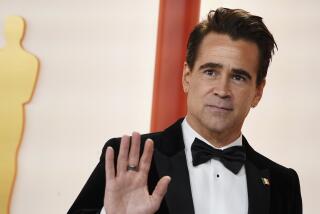Joseph Farrell dies at 76; introduced market testing to Hollywood
- Share via
As founder, chairman and chief executive of National Research Group Inc. from 1978 to 2003, movie market researcher Joseph Farrell introduced the concept of market testing to Hollywood, originating now-standard industry practices such as audience tracking surveys, focus-group preview screenings and demographic analysis of moviegoers. Over the decades, NRG’s confidential research reports were used by all of the major Hollywood studios to make decisions about release dates, tweak marketing campaigns and — sometimes to the unease of filmmakers — tinker with movies.
Farrell, who became a film producer after leaving the National Research Group, died Wednesday of natural causes in Los Angeles, according to a family spokesman. He was 76.
“Not only did he really invent the research business for motion pictures, but it’s the standard everybody still uses today,” Dick Cook, former chairman of Walt Disney Studios, said Monday. “I don’t recall a movie we were ever involved in that Joe didn’t play an integral part in helping us shape both the movie and also the campaign.”
A noteworthy example of NRG’s impact was on the 1987 thriller “Fatal Attraction,” which got a new ending when test screenings revealed that audiences wanted Glenn Close’s character to be punished for tormenting Michael Douglas’ adulterous character and his wife, played by Anne Archer.
“It’s not just that you get the information,” said Michael Rosenberg, president of the production company Imagine Entertainment, whose movies “Apollo 13,” “A Beautiful Mind” and “Nutty Professor” reflected Farrell’s contributions. “It’s how you interpret it and how you use it. Ultimately, the industry benefited in not going by the seat of our pants and actually having some hard numbers to go by.”
In NRG’s early years, Farrell and his longtime business partner, Catherine Paura, conducted their own research interviews in parking lots, sometimes bribing children with ice cream cones to participate. An initial champion of the company was director Francis Ford Coppola, whose 1979 movie “Apocalypse Now,” was one of NRG’s test cases. By 1996, shortly before it was bought by Dutch media conglomerate VNU, NRG was worth $44 million.
In 2003, Farrell and Paura left NRG and formed the production company FP Productions, which has just completed “Joyful Noise,” a musical film set for release in January by Warner Bros. The company also has the film “The Leonardo Job” in development with Alcon Entertainment.
In Hollywood, Farrell was known for his knack for distilling data for the artistic-minded, a skill that came in part from his own background as a sculptor and painter, Paura said.
“He was a trained artist, so his approach to research combined the empirical and quantitative with the artistic,” she said.
Born Sept. 11, 1935, in New York City, Farrell attended St. John’s University, studied sculpture at the University of Notre Dame and graduated with a law degree from Harvard University. He practiced law and held a variety of positions in the arts, including vice president and chief operating officer of the American Council of Arts. In 1977, political pollster Lewis Harris hired Farrell to open a West Coast office, where Farrell began to apply the research practices increasingly common in other industries to Hollywood.
Farrell continued to cultivate his artistic side after founding NRG: He served as an executive and consultant to the Carnegie Corp. of New York, the National Endowment for the Arts and the Rockefeller Brothers Fund, developed the U.S. Arts and Cultural Trend Data System for Congress and wrote the books “Americans and the Arts,” “Museums: USA” and “The Cultural Consumer.” He even designed furniture under the name Guiseppe Farbino.
“Joe was so extraordinarily well read and always up to date on anything that was pop culture,” Cook said. “He wasn’t just about the numbers, he was about the feeling. It was a rare balance that you don’t find in a lot of people. Joe had both his left and right brain working all the time; he was analytical but he was very creative. He could communicate with filmmakers so that they understood the research artistically and not just numerically.”
Farrell is survived by his wife, actress Jo Champa, and son, Sean.
More to Read
Start your day right
Sign up for Essential California for the L.A. Times biggest news, features and recommendations in your inbox six days a week.
You may occasionally receive promotional content from the Los Angeles Times.





















































